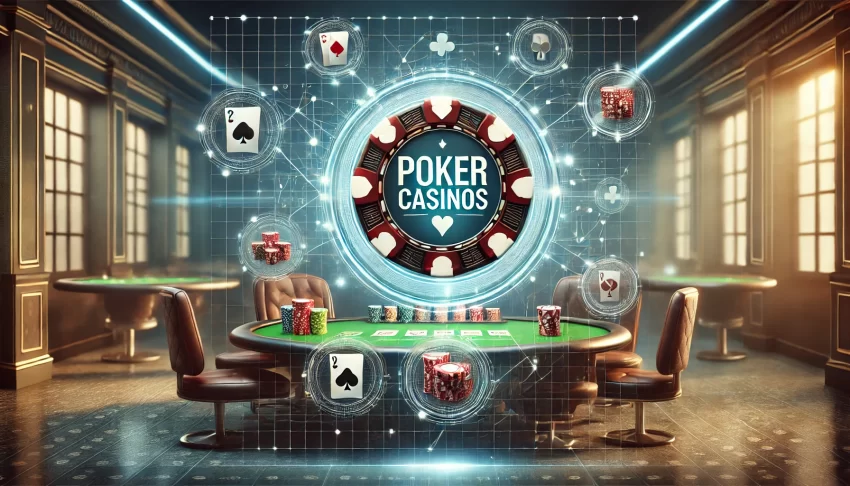Remember the days when poker meant smoky rooms, green felt tables, and the clinking of chips? Those times are fading fast. Today’s poker scene has gone digital, with online casinos dealing virtual cards to millions of players worldwide. Let’s explore how this shift happened and what it means for card sharks and casual players alike.
The Digital Poker Revolution
The internet changed everything – including how we play cards. Online poker casinos burst onto the scene in the late 1990s, offering a new way to enjoy the game from home. This section will delve into the rise of digital poker rooms and their impact on the gambling landscape.
The first online poker games were basic affairs. Clunky graphics and slow connections were the norm. But they offered something revolutionary: the chance to play anytime, anywhere. No need to round up friends or trek to a casino. A few clicks, and you were at a virtual table.
As technology improved, so did the online poker experience. Better software made games smoother and more realistic. Mobile apps let people play on the go. Soon, online poker wasn’t just convenient – it was often better than the real thing.
The poker boom of the early 2000s poured fuel on the fire. Televised tournaments made stars of poker pros. Suddenly, everyone wanted to try their hand at Texas Hold’em. Online casinos were ready to meet that demand, offering games for every skill level and budget.
Today, the online poker market is massive. Millions of players log on daily to sites big and small. From penny stakes to high-roller tables, there’s a game for everyone. The digital revolution has truly democratised poker.
Features of Online Poker Casinos
What sets online poker apart from its brick-and-mortar cousins? This section will explore the unique aspects of digital card rooms and how they’ve changed the game.
One key difference is variety. Online casinos can offer a dizzying array of poker variants. Beyond staples like Hold’em and Omaha, you’ll find obscure games that rarely appear in physical casinos. This variety keeps things fresh and lets players explore new challenges.
Speed is another factor. Online games move faster, with no shuffling or dealing to slow things down. Multi-tabling – playing several games at once – is also possible online. These features let skilled players see more hands per hour, potentially increasing their profits.
Online poker also offers unique tools for learning and improvement. Many sites have built-in hand histories and analysis features. Players can review their play, spot mistakes, and track their progress over time. Some even offer AI-powered coaching tools.
Here’s a quick comparison of online vs. traditional poker:
| Feature | Online Poker | Traditional Poker |
|---|---|---|
| Accessibility | 24/7 from anywhere | Limited by location and hours |
| Game Variety | Vast selection of variants | Usually limited to popular games |
| Speed of Play | Fast, with multi-tabling options | Slower pace |
| Learning Tools | Built-in analysis and tracking | Limited, mostly through observation |
| Social Aspect | Limited, though improving with tech | Face-to-face interaction |
| Tells and Reading Opponents | Based on betting patterns and timing | Includes physical tells and body language |
The Economics of Online Poker
The shift to digital has shaken up the poker economy. This section will examine how online casinos make money and what that means for players.
Unlike traditional casinos, online poker rooms don’t need to maintain physical spaces or employ dealers. This lower overhead can mean better odds and lower rake (the house’s cut of each pot) for players. Some sites even offer rakeback programs, returning a portion of fees to regular players.
The flip side is increased competition. With so many options available, online casinos must fight for players’ attention. This often leads to generous bonuses and promotions. Smart players can boost their bankrolls by taking advantage of these offers.
Another economic factor is the global nature of online poker. Players from different countries with varying economic conditions compete at the same tables. This can create interesting dynamics, especially in games with real-money stakes.
The online poker economy also supports a whole ecosystem of related businesses. From training sites to software tools, there’s a mini-industry built around helping players improve their game.
Challenges and Concerns
While online poker has brought many benefits, it’s not without its issues. This section will address some of the challenges facing the digital poker world.
- Cheating and collusion are major concerns. It’s easier for players to team up or use software to gain an unfair advantage online. Reputable sites invest heavily in security measures to detect and prevent such behaviour.
- Addiction is another worry. The constant availability of games can make it hard for some players to step away. Most responsible sites offer tools to help players set limits on their time and spending.
- Legal issues also loom large. Different countries have varying laws around online gambling. This patchwork of regulations can make it tricky for both players and operators to navigate the global market.
The Future of Online Poker
What’s next for digital card rooms? This section will look at emerging trends and technologies shaping the future of online poker.
Artificial intelligence is making waves. AI opponents are getting smarter, offering tougher challenges for skilled players. Some worry this could lead to “solved” poker games, but others see it as a way to push human players to new heights.
So, as we look to the future, one thing is clear: online poker is here to stay. It’s transformed a centuries-old game, making it more accessible and dynamic than ever before. Whether you’re a seasoned pro or a curious newcomer, the digital felt offers endless possibilities. Just remember, while the thrill of the game is real, online poker should be about fun, not a path to riches. Play responsibly, and may the digital cards fall in your favour!

